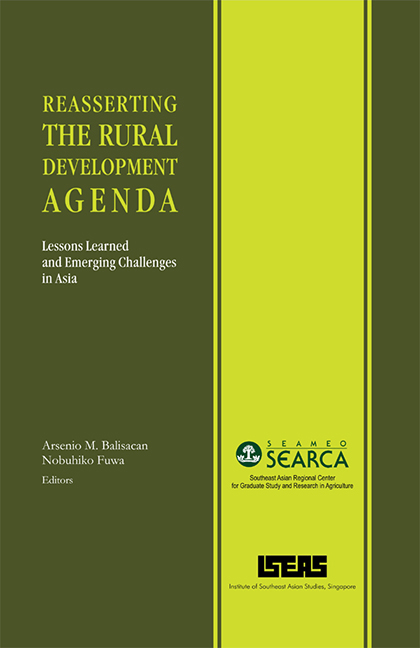Book contents
- Frontmatter
- Contents
- Tables
- Figures
- Preface
- Contributors
- 1 Challenges and Policy Options for Agricultural Development – Overview and Synthesis
- 2 The Economics of Agricultural Development: What Have We Learned?
- 3 The Role of Social Structures and Norms in Agricultural Development: Africa and East Asian Communities Compared
- 4 Food Security in a Globalised Setting
- 5 Poverty and Vulnerability
- 6 Asian Agricultural Development: From the Green Revolution to the Gene Revolution
- 7 Dryland Agriculture in Asia: Ideas, Paradigms, and Policies
- 8 Establishing Efficient Use of Water Resources in Asia
- 9 Improving the Delivery of Extension Services to Rural People: New Perspectives
- 10 Land Tenure and Forest Resource Management in Asia
- 11 Globalisation and the Poverty-Environment Link in Asian Agriculture
- 12 The Supermarket Revolution with Asian Characteristics
- Index
7 - Dryland Agriculture in Asia: Ideas, Paradigms, and Policies
Published online by Cambridge University Press: 21 October 2015
- Frontmatter
- Contents
- Tables
- Figures
- Preface
- Contributors
- 1 Challenges and Policy Options for Agricultural Development – Overview and Synthesis
- 2 The Economics of Agricultural Development: What Have We Learned?
- 3 The Role of Social Structures and Norms in Agricultural Development: Africa and East Asian Communities Compared
- 4 Food Security in a Globalised Setting
- 5 Poverty and Vulnerability
- 6 Asian Agricultural Development: From the Green Revolution to the Gene Revolution
- 7 Dryland Agriculture in Asia: Ideas, Paradigms, and Policies
- 8 Establishing Efficient Use of Water Resources in Asia
- 9 Improving the Delivery of Extension Services to Rural People: New Perspectives
- 10 Land Tenure and Forest Resource Management in Asia
- 11 Globalisation and the Poverty-Environment Link in Asian Agriculture
- 12 The Supermarket Revolution with Asian Characteristics
- Index
Summary
Introduction
Dryland ecosystems, where most of the world's poor live, are characterised by extreme rainfall variability, recurrent but unpredictable droughts, high temperatures and low soil fertility. The underdevelopment in the dryland1 region of Asia reflects the pervasiveness of poverty, as demonstrated by continuing concerns about malnutrition, migration due to frequent droughts, growing constraints of the natural resource base (water scarcity and land degradation), lack of infrastructure, poor dissemination of improved technologies and effects of government policies, and further economic liberalisation (GT-SAT Futures 2002). Dryland areas indeed present significant constraints to intensive agriculture.
The Green Revolution of the 1960s and 1970s — with its package of improved seeds and chemical fertilisers, and enhanced farm technology and irrigation — successfully attained its primary objective of increasing crop yields and augmenting aggregate food supplies. In Asia, where the package was most widely adopted, food production increased substantially during those decades. Despite its success in increasing aggregate food supply, the Green Revolution as a development approach has not necessarily translated into benefits for the lower strata of the rural poor in terms of greater food security or greater economic opportunity and well-being. Moreover, vast expanses of dryland regions were bypassed by the Green Revolution. They had failed to attract commercial investments in agricultural technology due to small or non-existent markets.
Development planners and policymakers are now increasingly eyeing the hitherto less-favoured dryland regions, where agricultural transformation is yet to take off. Due to issues of equity, efficiency and sustainability, the need to improve the productivity of dryland agriculture has become more compelling, given that the growth opportunities in irrigated areas are being exhausted.
This paper summarises the major challenges in achieving food security, income growth, poverty reduction and environmental sustainability for the dryland regions of Asia. It also identifies future strategies and priorities as it highlights emerging issues that threaten the sustainability of dryland agriculture and future sources of growth.
The next section presents an overview of the dynamics of dryland agriculture. It is followed by an analysis of the persistent challenges facing it, and identifies opportunities such as agricultural diversification, trade liberalisation, the commercial orientation of agriculture, and institutional innovations. Finally, implications for policy, research priorities and development pathways are drawn, followed by a vision for Asian dryland agriculture.
- Type
- Chapter
- Information
- Reasserting the Rural Development AgendaLessons Learned and Emerging Challenges in Asia, pp. 191 - 226Publisher: ISEAS–Yusof Ishak InstitutePrint publication year: 2007

